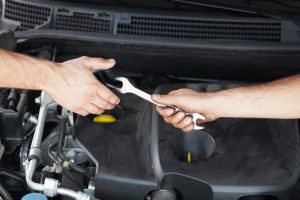
Note: CreditGUARD does not promote the indiscriminate sharing of your possessions. If you choose to be neighborly and lend things out, make sure that there’s accountability.
You should never lend out valuable equipment to someone you don’t trust or don’t know well. Always be responsible and discerning. CreditGUARD is not responsible for any unreturned property.
If you were to take a look on a website like Craigslist today, you’d probably find thousands of items for sale. In fact, in your town or even in your own neighborhood, several of the same items are probably for sale — for pennies on the dollar because people just want the stuff gone.
Over the years, even the cautious among us tend to accumulate things — things that, often, become clutter or even worse — end up in a storage unit that costs hundreds of dollars per month.
If you’re looking to create a better financial future for yourself, one way to start is to stop buying things you don’t need.
If you have a situation where you need an item for a single task, you could perhaps rent it or borrow it from a friend.
The question that this sort of overflow raises is — how many things do we actually need to own?
The Economy of Sharing
Society has been sharing assets for a long time. One good model?
The public library. People within a community get shared access to books, periodicals and even music and movies.
We’ve seen some libraries begin to function like co-ops for the sharing of different kinds of resources like power tools or museum passes.
If you’re looking for a creative way to save money, consider talking to your neighbors. Chances are, there’s someone in your circle who could make use of something that’s gathering dust in your garage, and vice-versa.
Whether it’s a niche tool or an expensive resource that not everyone owns, chances are that you and your neighbors could put your heads together and find some ways to save.
For instance, does everyone on your block need a full woodshop in their basement or garage? How about a wood chipper or an auger? Probably not. Does everyone need to own a top-of-the-line lawn mower? Again, probably not.
Would these items see more use and add more value if they were shared? Definitely!
Keeping track of these kinds of community “libraries” may seem challenging, but you can implement a catalog and schedule or calendar easily enough. If you’re all plugged in to Facebook or Gmail, you can create a group where people can share requests, keep track of who’s using what, and leverage each other’s personal network to locate other “rare” or only occasionally-used items that can be shared.
Here’s a list of common items that are shareable, broken down by category:
Automotive
Jack stands
Shop vacs
Air compressors
Socket wrench sets
Lawn Care
Lawnmower
Weed trimmer
Edger
Pruning shears
Aeration tools
Garden tools
Wheelbarrow
Bulk fertilizers
Power tools
Drills
Saws
Augers
Sanders
More Ways to Save
There are other ways to come together and save. Consider going in together on bulk groceries from stores like Sam’s Club or Costco. Splitting the cost of a large quantity of home goods like toilet paper or paper towels can be a good way to save without inundating your pantry with tons of bulk goods. You can do the same with bulk meats and vegetables, provided you can properly package and store them.
If you don’t have neighbors who want to build a sharing library with you, consider your social network. You could build a virtual library through connections on social media, or with other people, you’re connected within your family or at work. Don’t let proximity limit your thinking on how you can share your resources and leverage those of others who are willing.
Again, never lend valuables out if you’re not comfortable with it or to anyone you don’t trust. Another rule of thumb is this — if you can afford to lend it, you can afford to lose it. Other people could break your equipment or just not return it.
If you’re in a situation with your current debt situation that feels unmanageable, you’ve got a resource right here in CreditGUARD. Our certified credit counselors can help you get back on your feet with financial education and nonprofit debt consolidation that doesn’t involve any new loans. If you’re ready to get your financial future in order, call CreditGUARD today to learn more about how we can help you move forward!
